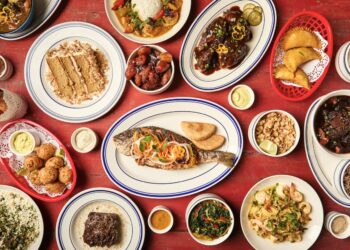Bars throughout the GCC, but in particularly in Dubai, be it standalone or within a hotel, are big business with many bursting at the seams come the weekend. But there is a far greater variety of venues than drinks on offer, as Catering News discovered when it brought together a select group of beverage managers last month for a round table discussion at the A&E PATH training school
How does the bar scene compare in the UAE to the rest of the world?
Paul: The scene is very commercialised here, due to the nature of the financing that goes into the venues. The independent sector is an irrelevant term.
Jan: There is a lot of franchising with a fight for the big names. The allowances for execution and staff can be an issue and there is a big difference between stand alone and hotel bars in terms of hours worked and responsibility loading – in terms of how much can staff be expected do, and how much they can earn.
James: The ways distribution works – mainstream products are easily available, but it can be a challenge to play outside the box as the box is smaller here. Sometimes it’s tricky to deal with certain brand managers because they don’t speak the same language as bar managers in terms of the products pushed.
Richard: With only two distributors products will be limited. But then a hundred years ago there was no purple paint but it didn’t stop masterpieces being produced.
James: It is tricky to push new brands because the mark-up is so high – customers question paying more for something they don’t know.
Jason: With any smaller emerging markets the price of smaller stock products makes them difficult to push, and consumers want pay more for something they don’t know.
Jan: The market is growing and improving since I arrived four years ago. The selection of spirits improves every year and customer demand is becoming broader. But if you want to get your profitability or rebates you follow the big brands that are pushing. I’d rather get support from the brand than push something myself that the customer might not like and I would lose money.

PARTICIPANTS (left to right):
1. Jason Clark, luxury trainer, African and Eastern (A&E)
2. Brent Henson, beer sommelier, African and Eastern (E) PATH
3. Paul Bradley, beverage manager, Suite 27, Burj Al Arab
4. Rosco Nolan, group bar manager, Mohiki, Jumeirah Beach Hotel
5. Adam Carr, founder, Aura Beverage Consultancy
6. James Ester, bar manager, Cavalli, Fairmont
7. Jan Liska, beverage manager, BOCA, DIFC
8. Richard Cohen, training manager, African and Eastern (A&E) PATH
What does the trade need to do to support niche products?
James: If we could all get together [bar managers] and create a group like Facebook to prove demand, then orders would be guaranteed and distributor would be more inclined to import the stock we want.
Jason: I am going through a transition period at the moment. It took me a year to get my head around the pricing, and for us to get a product on the portfolio it has to go through ten people and processes to be checked out. This makes it a much higher price which has to be passed on. However, we have now appointed someone dedicated to managing our special imports.
Paul: It’s a matter of readjusting to working with and without certain products. As there is always a high turnover of people through Dubai, it’s a matter of stopping to think about what’s available elsewhere.
How active are brands in training and promoting to bar staff?
Adam: Some might say too brand orientated but is that really a negative? Not really. There is an abundance of training available so bar tenders have the opportunity to learn and develop as they choose – if they can get the time off.
Paul: I always warn my team, before they embark on brand training, to look for the truth and get away from the spiel. To stick to the history of the spirit not the brand talk.
Richard: Five years ago there was only brand focused training, we did Guinness and MMI did Chivas. It is OK to learn about Tanqueray 10 but you need to know where it fits in the gin sector. So we have consciously driven independent accredited training and today no other market can afford to do the training we do here: New York, London, Las Vegas, nobody has a school like this.
What role do outlets have in training staff or should distributors go in and take staff from A-Z?
Adam: I’d put all my staff though comprehensive training if I could spare the time.
Paul: I never have a fair lead up time, I have always been pushed to get the bar up and running and that doesn’t allow enough time to write any proper training course schedules; and it knocks on. Bars aren’t aware of scope required for training and they don’t allow the time for it.
Jan: Ideally I would go every day and do training but with all the other things around we don’t have time. For a standalone to do onsite training wouldn’t be good for the market as the staff would be poached and we’d lose the personalities we get.
Adam: There is plenty of talent here that would go to an independent as there are fewer rules, like you are free to order as you please and price accordingly.
Rank in Importance to your business: Training, specialist spirits and interior design.
Paul: Training is the most important factor for a bar; every day. It doesn’t matter if you are in a black box so long as there is some entertainment at the bar.
Adam: Most people leave the house and go to restaurants to spend a lot of money for the experience. Personally, I can be served bad food but if the bar tender or hostess has given me professional service, and I’ve enjoyed it, I’d go back.
Jason: In Dubai the emphasis is placed on the four walls before the staff, but this is where they get it wrong.
Rosco: It is no good having great products if the staff have no education on them. We are all waiting for the day when a top chef opens a restaurant in a really relaxed and informal setting. To a degree that is what is happening in Catch: a low key interior, very down to earth, and it serves great food without the distraction of bling.
Is the salary and package fair for bar staff?
Jan: There is no market stabilisation here and so wages differ widely from venue to venue and from a hotel to a standalone. In a standalone the wages are roughly twice as much at around AED3-4,000 per month, compared to AED1,500 in a hotel, so the market is very transient.
Paul: There is also a system of pyramid stacking here, where you hire one experienced guy at the top and a stack of juniors, paid next to nothing, below him. This is the only place I have seen were the bar manager can earn ten times that of a bar tender.
Who should be responsible for organising bar and drink promotions?
Paul: It is the bar manager’s role and when the marketing team gets involved the intention gets diluted. However, marketing and sales have a lot of involvement around brand awareness and training.
James: All brand-led promotions are positive as its get everyone involved and gives smaller outlets a way to get involved.
Adam: Promotions may encourage people to try new things and subtly educate customers.
James: It depends on the venue as to who decides. We have a lot of special imports and I like to push those, and as a smaller outlet I can talk to customers directly and educate them. I have a far more intimate relationship with my guests.
Jan: Promotions like happy hour are all about returns from the distributors, we need lots of FOC and brand support.
Paul: If you offer discounted drinks you should actively promote a brand and not discount across the board as this devalues the venue.
Jan: If it’s a promotion with food and targeted discounting then that works and it doesn’t devalue the brand.
Jason: Big hotels need to do happy hour promotions because they price themselves so high – they need to draw people in for some period of time. But they are fighting themselves.
Paul: Only so many people will come for happy hour, and they will fill up and then leave. They order five drinks at the end of the hour and then that’s them done for the night – that’s a lot of lost revenue. But then it’s often vital for outlets to do happy hours or ladies nights to offload promotions from the suppliers that can’t be used on a regular night or else they have stock sitting doing


































































